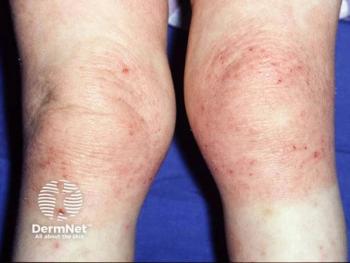
A New Study Examines the Safety Profiles of JAK Inhibitors for Atopic Dermatitis
The author of a new study on JAK inhibitors discusses his surprising findings on the safety profiles of these new medications for dermatologic conditions.
Christopher Bunick, MD, PhD, scientist and associate professor, Department of Dermatology at the Yale School of Medicine, recently co-authored a paper with Stefano G. Daniele, PhD, Medical Scientist Training Program at Yale School of Medicine, titled "JAK inhibitor safety compared to traditional systemic immunosuppressive therapies."
Here he discusses the highlights of his findings, published in the Journal of Drugs in Dermatology, including some suprising results of these boxed warning drugs compared to traditional therapies for the treatment of atopic dermatitis and other disorders. Noted Mark Lebwohl, MD, Mount Sinai, New York, New York, "This paper puts the boxed warnings on JAK inhibitors into perspective. Risks of myocardial infarction, clotting, infection and cancer are significantly lower when using JAK inhibitors than the risks associated with other psoriasis or atopic dermatitis therapies. In fact, the number of events per hundred patient-years allows us to see just how uncommon those serious adverse events are."
Transcript (edited for clarity):
I'm really excited about this paper that I coauthored with Stefano Daniele, recently published in the Journal of Drugs and Dermatology. It focuses on a very important topic in dermatology, which is the JAK inhibitors’ safety. We've seen over the past year, a number of JAK inhibitors approved, for atopic dermatitis, and one for alopecia areata. But what's really dominated the discussion has been the box warnings and the safety of these medications. We asked a simple question, and that was, how does the safety of the JAK inhibitors for atopic dermatitis compare to some of the traditional systemic agents that we always used for atopic dermatitis in the past decade or so such as cyclosporine, methotrexate, and systemic prednisone?
Interestingly, what we found is that the JAK inhibitors actually tended to be safer than these systemic agents that we didn't really think twice about using for severe atopic dermatitis patients in the past, like methotrexate, cyclosporine. And oral steroids like prednisone. In fact, oral prednisone, which does not have a box warning, had some of the highest rates of side effects, in particular, the concerning side effects like mace events, malignancy, and VTE rates. So when we think about JAK inhibitors, and think about safety, one of the really interesting things that came out of this study was the fact that the JAK inhibitors really ought to be positioned ahead of all of these systemic traditional therapies that we commonly and routinely used for atopic dermatitis, patients with moderate to severe disease in the past.
This might be a little bit different than what we originally thought when JAK inhibitors hit the market, because we heard about box warnings, and the serious potential safety risks of these medications. And certainly, in the older populations, and patients that have certain comorbidities, you have to take these potential adverse events seriously. But when we calculated the adverse event rate per 100 patient years, it turns out that the JAK inhibitors on the whole tend to be safer than some of our traditional systemic agents. And I think that this is going to be really helpful for dermatologist in determining how to position JAK inhibitors in their practice. And in discussing with their patients, the real world risk of these agents.
Newsletter
Like what you’re reading? Subscribe to Dermatology Times for weekly updates on therapies, innovations, and real-world practice tips.











